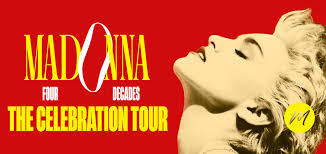Today’s triangulation problem involves Bandcamp, the beloved online music purveyor that was recently sold to the music-licensing operation Songtradr and promptly laid off staff; Madonna, the megastar who, after an illness, began a world tour this week without the services of a band; the New York Times Popcast, which recently aired an episode titled “Do We Need Album Reviews Anymore?” that featured thoughts from the insightful musician and commentator Jamie Brooks.
If you’re keeping score of the depressing trends affecting the communities involved in the world of music, these things are connected. They reflect the realities of making and consuming art in the aftermath of streaming’s triumphant (?? can’t believe I typed that!!) takeover of distribution. They reflect slow but steady changes in the public’s orientation toward music in the digital era: Noting that the average streaming subscriber likely doesn’t think an album is worth $10 anymore, Brooks says flatly, “Recorded music has become intensely devalued.”
That’s not a news flash. But it bears repeating, at regular intervals. Because lots of these scattered, seemingly isolated developments have root in that reality.
The Popcast conversation between Brooks and host Jon Caramanica stretched far beyond the promise of its title, and sparked lots of handwringing discussion on social media and the places where formerly employed critics (like me!) gather to do their ritual groaning. The views vary wildly, from “Since music is an endlessly browsable commodity, we don’t need reviews to guide listening discovery” to “The function of the review is to provide long-view perspective and historical/aesthetic context; as long as artists release music in album form, informed and critical review should be part of the conversation.”
The latter is close to my view of this – and, to varying degrees, that’s how it (still) is in other artforms, a small miracle given the alarming decline of arts coverage in mainstream media.
For most streaming listeners, the review is an extra step. Tracking down credits, which often means searching outside of the streaming platform, are an extra step – even though that step is virtually guaranteed to lead to new discoveries. Add it up: The consumer has been superserved in a way that short-circuits curiosity. If it’s Bad Bunny you want, then Bad Bunny you shall have, and there’ll be no static at all from other sources like critics, who might (in the spirit of enhancing appreciation) gently shine a flashlight upon antecedents or other related artists.
The streaming pitch is about abundance – look at all this music, yours to rent! At the same time, the user experience (at Spotify and, to lesser degrees, all the others) is fundamentally and profoundly anti-music. Streaming encourages listeners to make snap judgements, to reject (swipe here!) rather than wrestle with what is alien or unusual; it renders the creators of the art anonymous; its playlists are skewed by popularity, and adhere to genre and other classification distinctions that creative musicians have obliterated. There’s more, but it feels like piling on. And we haven’t even gotten to the evil payment algorithms.
As Brooks implies and many others (myself included) have said, the accrued subliminal impact goes way beyond the numbers: That nagging sense we have that music is devalued is not accidental or ephemeral – it’s baked into the architecture of streaming. And it shapes attitudes toward everything in the music space – which is why the recent developments at Bandcamp are so concerning.
For a generation now, Bandcamp has served as a direct conduit between makers and those who, having often discovered them through the site’s journalism or sophisticated recommendations, want desperately to support the artists. The service supports and celebrates a staggering, truly awesome range of musical endeavor – and, significantly, represents artists from all over the world. As streaming has grown more hostile to art, Bandcamp has been the place where the ongoing (and, for abovestated reasons, increasingly difficult) act of creating original music is celebrated in all caps and neon colors. John Darnielle of the Mountain Goats put it this way in a post, presumably intentionally using past tense: “Bandcamp was an unalloyed good in the music business.”
It's too soon to know what the new ownership will mean for Bandcamp; Songtradr’s CEO, Paul Wiltshire, has made sure that handout photos put him in close proximity to an electric guitar, as though that image would reassure anyone about the intentions of a company that has grown primarily by buying other companies. The collective gasp from users at the recent news is itself an indicator of peril – suggesting just how fragile the music ecosystem really is, and what a blow it would be to lose this one element of it.
Here I must pause to share a delightfully apt new-to-me term that appeared in the Pitchfork Bandcamp story – “enshittification” comes from culture tracker Cory Doctorow and refers to the ways online businesses transform, over time, from serving user to maximizing value for shareholders.
Which brings us to Madonna. Whose Celebration tour, previously delayed by illness, opened this week in London. The British media covered it with the expected breathlessness, barely batting an eye when Madonna’s musical director Stuart Price told the BBC that there wouldn’t be a band on stage behind her. More room for choreography!
That’s right, Mado has a musical director (well paid, certainly), but no band. It’s not clear what this director does – press play at the right moment? If so, he might be looking for a new job, because four songs into the opening show, 65-year-old Ms. Ciccone was left suddenly music-less, and forced to vamp on stage (about, what else, her childhood!) while the snafu was fixed.
Madonna is doing 78 performances on several continents. She’s already sold lots of the tickets. They’re not exactly cheap. The production looks to be as extravagant as her previous tours, most of which featured live music and live vocals. The cost of a band here is not even a rounding error on the ledger sheet of this production.
Interestingly, there’s been very little media discussion of this musician-free arena tour – though, right on cue, the British press did murmur something about lip-syncing. As though that was an affront. But the canned backing tracks? Those were just fine. That’s telling, because while Madonna doesn’t have the sway over the popular imagination she once did, she remains a massive star, and an industry force. She evidently thinks it’s possible to go bandless, and that means others will surely follow her.
Consider this tour more evidence of the larger shifts in attitudes around music, the erosion of it as not just commodity but cultural unifier. Madonna is basically saying that the video clips and dance routines are more central to her legacy than the music that drove those video clips and anchored those scenes in the first place.
One wonders if attendees of the Celebration tour will be momentarily troubled by the absence of musicians. Or if they’ll even notice.










Loved your latest on Bandcamp and Madonna. Going bandless? I'm not surprised. But it makes me think of the great Philly bassist Victor Bailey who toured with her in the 90s on her Girlie tour. The downfall of Bandcamp (and I'm not holding out hope the new owner will be beneficial) has squashed any idea of doing a new jazz project. Can't give away CDs, LPs are too expensive, now streaming is coopted. Sigh.
Yes Tom. It's a different world out there. Most people don't care that there are backing tracks, or even no band at all. They are there for the spectacle and don't mind that Pink could not possibly be singing like that while spinning in the air. Everything is bite-sized. Artists are shortening tracks to make them more playlist friendly. BT cut edits of all the tracks on his The Secret Language of Trees so they might make playlists on Spotify. And it's all transitory. There is no sitting down between the speakers with the gatefold cover open on your lap reading liners or lyrics or sucking up imagery. It's here in the background noise. And album reviews? No one cares except publicists.